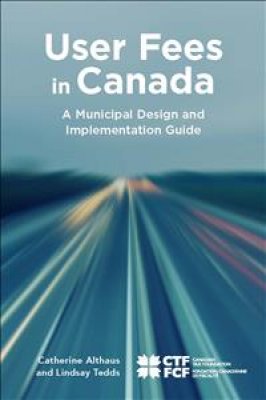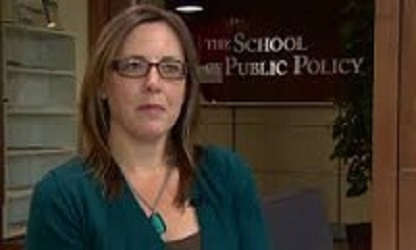
Media
Lindsay Tedds: The Second-Hand Economy
Second-hand goods used to be the stuff of church bazaars and flea markets, or help handed down to friends and family for free. But today technology enables sites such as Craigslist or Kijiji to get those goods out of the garage or basement and into a market worth billions of dollars each year in Canada alone. The Agenda examines how the second-hand economy has become a force to be reckoned with.
Economist Lindsay Tedds fact checks the leaders' points during the #GlobeDebate
University of Victoria economics professor on the significance of the last recession, the volume of job creation by small businesses
BIG Conference 2016 - Dr. Lindsay Tedds
Dr. Lindsay Tedds is Interim Director of the School of Public Administration at the University of Victoria. Her primary research and teaching area is applied economic research and policy analysis, with a particular focus on tax policy. She has also held several posts with the Government of Canada in Ottawa in the areas of public economics and policy implementation. In her presentation, Dr. Tedds explores tax implications of a basic income guarantee based on various models.
The Second-hand Economy
TVO The Agenda, March 16, 2016Television
URL: http://tvo.org/video/programs/the-agenda-with-steve-paikin/lindsay-tedds-the-second-hand-economy
Second-hand goods used to be the stuff of church bazaars and flea markets, or help handed down to friends and family for free. But today technology enables sites such as Craigslist or Kijiji to get those goods out of the garage or basement and into a market worth billions of dollars each year in Canada alone. The Agenda examines how the second-hand economy has become a force to be reckoned with.
Dodging the Tax Man
TVO The Agenda, April 8, 2016Television
URL: http://tvo.org/video/programs/the-agenda-with-steve-paikin/dodging-the-taxman
This week, news organizations around the world were reporting on the Panama Papers, an information leak showing who's been hiding money offshore. Some of the focus has been on celebrities and world leaders, but most of the names are regular business people engaging in a mostly legal practice. The Agenda discusses the legality and morality of offshore tax havens.
CBC The 180, October 18, 2015Radio/Podcast
At the start of the campaign, The 180 checked in with the so-far imaginary Economist Party, to get a sense of what Canada would look like if it was run by economists. This week, Economist Party "candidates", Lindsay Tedds and Stephen Gordon, give the major parties an economics report card.
CBC The 180, August 30, 2015Radio/Podcast
180 host Jim Brown speaks with two economists, Lindsay Tedds from the University of Victoria, and Livio Di Matteo from Lakehead University, for their take on the campaign so far.
What a Liberal government could mean for the economy
Globe and Mail, October 20, 2015Online
URL: https://www.youtube.com/watch?v=P6TNpZYxvio
The Globe's Dave Parkinson chats with Lindsay Tedds, associate professor of economics at the University of Victoria to discuss what a Liberal government means for the Canadian economy
What does it mean? The economic questions raised by Trudeau’s win
Globe and Mail, October 21, 2015Online
The election results are in and the Liberals have won a majority government. Since most of the polls were predicting a minority, the clear majority takes off the table a lot of economic questions about the new government. But what economic questions remain? Lindsay discusses some of them.
The foreign buyer tax leaves us with the wrong kind of speculator
Globe and Mail, July 29, 2016Online
This week, the B.C. government announced a new 15-per-cent property transfer surtax to be applied to all foreign buyers of residential property in the Greater Vancouver Regional District, effective on transactions closing on or after Aug. 2, 2016. The objective of the tax is to curb foreign speculators from investing in residential real estate in the GVRD and help to cool the rise of prices. Lindsay parses the impact of this tax on speculators.
Quantifying the impact of Canada’s second-hand economy
Globe and Mail, March 1, 2016Online
Lindsay details the size and consequences of the second-hand economy in Canada.
Post-show analysis from the leaders' debate on the economy
Globe and Mail, September 17, 2015Online
URL: https://www.youtube.com/watch?v=-KvdSqukzuA
Host Jane Taber sits down with Report on Business editor Paul Waldie, political columnist John Ibbitson and economist Lindsay Tedds to de-construct the performances of the leaders during the debate on the economy
I am Lindsay Tedds, Ask Me Anything about Canadian Tax Policy
Reddit, July 25, 2015Online
I am an associate professor at the University of Victoria's School of Public Administration, and I specialize in tax policy. I'll try to answer any questions you have about Canadian tax policy.
Do tax credits help Northern mining? Economists and industry disagree
CBC, September 4, 2015Online
Everybody thinks it's a magic bullet but it doesn't do anything,' Lindsay says

User Fees in Canada: A Municipal Design and Implementation Guide
by Catherine Althaus and Lindsay M. Tedds
Canadian Tax Foundation
978-0-88808-283-1
User Fees in Canada: A Municipal Design and Implementation Guide provides an up-to-date and detailed review of the Canadian case law and academic literature concerning user fees, and it includes a comprehensive, practical guide to the design and implementation of user fees for municipalities. The book integrates the relevant scholarship from law, economics, and public administration in highlighting the key challenges that Canadian municipalities face when planning this kind of levy.
User Fees in Canada: A Municipal Design and Implementation Guide
Published by Canadian Tax Foundation
November 20, 2016
User Fees in Canada: A Municipal Design and Implementation Guide provides an up-to-date and detailed review of the Canadian case law and academic literature concerning user fees, and it includes a comprehensive, practical guide to the design and implementation of user fees for municipalities. The book integrates the relevant scholarship from law, economics, and public administration in highlighting the key challenges that Canadian municipalities face when planning this kind of levy.
URL: https://www.ctf.ca/ctfweb/EN/publications/product_detail.aspx?prod=USER&cat=Books
Do Insiders Comply with Disclosure Rules? Evidence from Canada, 1996-2011
Published by SPP Paper Series
October 12, 2016
Insiders of Canadian reporting issuers are required to file public reports when they acquire, buy, or sell securities of that reporting issuer. These public reports must be filed using a prescribed form and must be filed within a specific time frame. Failure to file these public reports or filing with inaccurate information constitutes an offence under securities law. The two main objectives served by these reporting rules are: (1) primarily as a regulatory tool to both communicate obligations as well as to prevent and detect the improper use of undisclosed information by insiders; and (2) to increase market efficiency by providing investors with information concerning the trading activities of an issuer. These objectives are dependent on compliance with the rules, yet no information regarding compliance exists. To investigate compliance a secondary source of information to verify the information provided in public reports must exist. In Canada, the CEO and the top four highest paid executives must report detailed information regarding their compensation, including stock option awards, in the annual report to shareholders. I collect information on stock option grants for these individuals for a sample of Canadian public companies for the period 1996-2011 and compare this information to that provided in the public reports. I find that while the majority of executives properly and accurately file public reports, a concerning minority fail to file or file inaccurate information. I consider the consequences of this finding and suggest ways to improve the quality of insider reporting in Canada.
URL: https://www.policyschool.ca/wp-content/uploads/2016/10/Insider-Trading-TeddsFINAL.pdf
Effects of the 2001 Extension of Paid Parental Leave Provisions on Birth Seasonality in Canada
Published by Canadian Public Policy
March 1, 2016
It is well known that there exists a strong seasonal pattern in births and that the pattern differs across geographic regions. While historically this seasonal pattern has been linked to exogenous factors, modern birth seasonality patterns can also be explained by purposive choice. If birth month of a child is at least partially chosen by the parents then, by extension, it can also be expected that this can be influenced by anything that changes the costs and benefits associated with that choice, including public policy. This paper explores the effect that the 2001 extension of paid parental leave benefits had on birth seasonality in Canada. Overall we find strong results that the pattern of birth seasonality in Canada changed after 2001, with a notable fall in spring births and an increase in late summer and early fall births. We discuss the potential effects of this unintended consequence, including those related to health and development, educational preparedness and outcomes, and econometric modelling.
URL: http://www.utpjournals.press/doi/pdf/10.3138/cpp.2015-054
Biography
Lindsay Tedds holds a BA in Political Science from Carleton University, a BA and MA in Economics from the University of Victoria, and a PhD in Economics from McMaster University. Tedds has previously held a faculty appointment at the University of Manitoba and was more recently a Visiting Professor at the School of Public Policy at the University of Calgary. She is a specialist in applied economic research and policy analysis, with a particular focus on the design and implementation of tax policy. Her work spans a number of topics including the underground economy, income underreporting, the tax treatments of stock options, the second-hand economy, user fees, insider disclosure, and birth seasonality. She is the co-author of two books and has published a number of book chapters, technical reports, interactive guides, and papers in peer reviewed journals. Tedds is a regular non-partisan public commentator, writing for print media, appearing on a variety of T.V., radio, and podcasts, and providing testimony to the House of Commons Finance Committee. She is a member of the research advisory board for the Northern Policy Institute and a member of the editorial Board for the Mowat Centre. Before becoming an academic, Tedds held several non-partisan posts with the Government of Canada in Ottawa as well as in municipal government in the areas of public economics and policy implementation.

